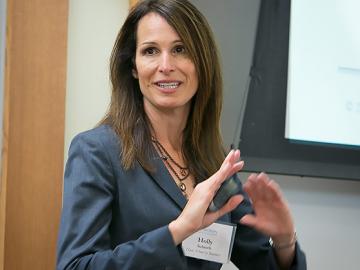A Conversation with Holly Schroth, Ph.D.
Millennials are everywhere: they’re graduating college, starting to buy their first houses, taking over your Facebook feed, and of course, entering the workforce. They bring new perspectives and different expectations of the work environment, but many companies aren’t ready for all of this change. Luckily, Berkeley Executive Education Professor Holly Schroth knows what organizations can do to address this.
Holly Schroth, Ph.D. is a Distinguished Teaching Fellow and Senior Lecturer (Continuing) at the Haas School of Business, UC Berkeley. She teaches topics such as Negotiation and Conflict Resolution, Power and Influence, and Strategic Communications. Dr. Schroth is the Program Director of both our #ManagingMillennials: Unleash the Power of the Millennial Workforce and the Negotiation and Influence programs. We recently spoke to Dr. Schroth about millennials in the workplace.
EXEC ED:
How did you get interested in studying millennials?
SCHROTH:
Many of my clients, both large and small, kept asking me how they could be more effective working with the millennial generation. I realized that many of the challenges they were experiencing were not unique to just them and that there were solutions based on applied social psychology that could benefit all generations in the workplace.
EXEC ED:
What do you see as the biggest challenge companies are facing today regarding millennials?
SCHROTH:
The biggest challenge is helping millennials learn how to work in ambiguity. This is the checklist generation where everything has been clearly spelled out for them and the business world doesn't give them a syllabus and rubric to work from.
EXEC ED:
What is the best advice you can give a millennial when they take a new job?
SCHROTH:
Understand the boss's expectations and demonstrate competency on all tasks no matter how menial you may think they are. Once you are considered a reliable source of performance, your boss will give you more interesting and challenging tasks but before then, you must prove yourself.
EXEC ED:
What does research say makes a millennial happy at work?
SCHROTH:
The research says that millennials want a boss who acts as a coach. This is a skill that will greatly benefit managers because not only will their millennials employees respond positively, but coaching greatly improves performance.
EXEC ED:
What is the typical style of work that’s preferred by millennials?
SCHROTH:
There is a conflict here because research shows they want interesting work but not the responsibility that goes with that level of work.
EXEC ED:
What kind of issues are you seeing in your research about communication between a multi-generational workforce?
SCHROTH:
Millennials prefer text over all other forms of communication. However, text is not always the most appropriate form of communication so managers have to coach their millennial employees on when to best use the different forms of communication and how often to communicate.
EXEC ED:
One of the defining principles here at Berkeley Executive Education is to question the “status quo” how does that principle relate to working with millennials?
SCHROTH:
The millennial generation brings new ideas to the workplace that can improve the workplace culture and efficiency. Change can be difficult but all parties can benefit from new ideas and practices.
EXEC ED:
What’s the best way for employers establish clear expectations?
SCHROTH:
Setting mutual expectations is a key to the successful onboarding of any new employee. It is best to sit down with the new employee and not only give a realistic job preview but go into great detail about your expectations for the employee. It is also helpful to understand any expectations your employee will have of you.
EXEC ED:
How can companies get millennials to stay?
SCHROTH:
Research shows the employees will stay when they feel that their boss is interested in developing them. The culture attracts the millennials but having a manager who coaches and gives them opportunities to further develop their skill set keeps them around, even if the company is facing its own challenges.
EXEC ED:
What skills can you give bosses and millennials to make communication better?
SCHROTH:
It is about setting those mutual expectations for when to use what communication medium and how often to communicate. In addition, it should be addressed how quickly to expect a reply. Millennials tend to expect a reply in minutes but the boss may not reply for hours if at all if it is not deemed important.



